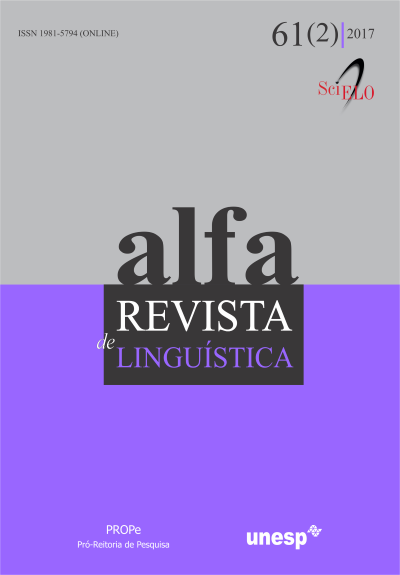Protocolo de avaliação de softwares pedagógicos: analisando um jogo educacional digital para o ensino de língua portuguesa
DOI:
https://doi.org/10.1590/1981-5794-1709-6Palavras-chave:
Ensino-aprendizagem de Língua Portuguesa, Jogos educacionais digitais, Protocolo de avaliação,Resumo
Como reflexo dos avanços das Tecnologias Digitais de Informação e Comunicação, e visando complementar o ensino, ferramentas digitais interativas, entre as quais podemos citar os jogos pedagógicos digitais, têm estado muito presentes nas escolas brasileiras. Assim, concorrem, hoje, na sala de aula, materiais didáticos impressos e digitais (doravante MDDs). Os MDDs, assim como materiais impressos, precisam passar por uma avaliação rigorosa. Sendo assim, neste trabalho, que foi embasado em Bakhtin/Volochínov (2009); Geraldi (2011); Halliday et al. (1974); e Koch (2002), propomo-nos a responder como se deve avaliar a qualidade de jogos pedagógicos digitais destinados ao ensino de língua materna. Quanto ao principal objetivo da pesquisa, pretendemos, a partir do Protocolo de Avaliação de Softwares Pedagógicos, que desenvolvemos para realizar essa investigação, avaliar a qualidade didáticopedagógica e ergonômica de jogos pedagógicos digitais disponíveis online. Na pesquisa, de caráter descritivo, avaliamos um jogo pedagógico digital destinado ao ensino de Língua Portuguesa. A análise revelou que, embora se tratasse de um jogo educacional digital de qualidade, esse objeto apresentou inadequações tanto quanto aos aspectos didático-pedagógicos quanto aos ergonômicos.
Downloads
Downloads
Publicado
Como Citar
Edição
Seção
Licença
Os manuscritos aceitos e publicados são de propriedade da Alfa: Revista de Linguística. É vedada a submissão integral ou parcial do manuscrito a qualquer outro periódico. A responsabilidade do conteúdo dos artigos é exclusiva dos autores. É vedada a tradução para outro idioma sem a autorização escrita do Editor ouvida a Comissão Editorial.

